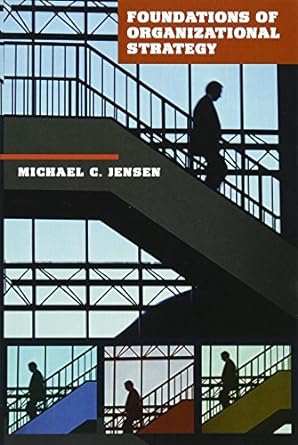Go back


Foundations Of Organizational Strategy(1st Edition)
Authors:
Michael C. Jensen

Cover Type:Hardcover
Condition:Used
In Stock
Include with your book
Free shipping: April 04, 2024Popular items with books
Access to 3 Million+ solutions
Free ✝
Ask 10 Questions from expert
200,000+ Expert answers
✝ 7 days-trial
Total Price:
$0
List Price: $15.24
Savings: $15.24(100%)
Book details
ISBN: 0674005643, 978-0674005648
Book publisher: Harvard University Press
Get your hands on the best-selling book Foundations Of Organizational Strategy 1st Edition for free. Feed your curiosity and let your imagination soar with the best stories coming out to you without hefty price tags. Browse SolutionInn to discover a treasure trove of fiction and non-fiction books where every page leads the reader to an undiscovered world. Start your literary adventure right away and also enjoy free shipping of these complimentary books to your door.
Foundations Of Organizational Strategy 1st Edition Summary: In this volume, Michael Jensen and his collaborators present the foundations of an integrated theory of organizations. The theory assumes that organizations are equilibrium systems that, like markets, can be influenced, but cannot be told what to do; that human beings are rational and self-interested for the most part; and that information is costly to produce and transfer among agents. The theory also treats business organizations as entities existing in a system of markets (including financial, product, labor, and materials markets) that must be considered in the formulation of organizational strategy.Jensen argues that the cost of transferring information makes it necessary to decentralize some decision rights in organizations and in the economy. This decentralization in turn requires organizations to solve the control problem that results when self-interested persons do not behave as perfect agents.Capitalist economies solve these control problems through the institution of alienable decision rights. But because organizations must suppress the alienability of decision rights, they must devise substitute mechanisms that perform its functions. Jensen argues that three critical systems, which he calls the organizational rules of the game, are necessary to substitute for alienability in organizations: (1) a system for allocating decision rights among agents in the firm, (2) a system for measuring and evaluating performance in the firm, and (3) a system for rewarding and punishing individuals for their performance. These concepts offer a major competitive advantage for organizations.
Customers also bought these books
Frequently Bought Together
Top Reviews for Books
Request ebsoo2b
( 4 )
"Delivery was considerably fast, and the book I received was in a good condition."










